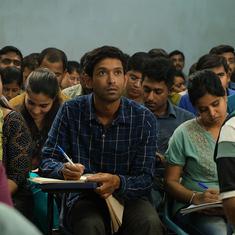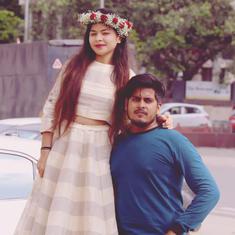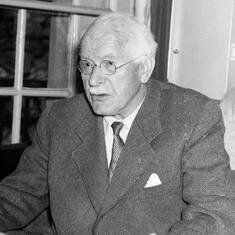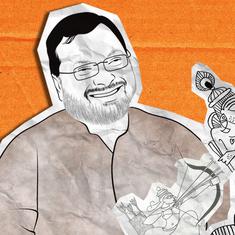The City is an Atlas of Lost Things
by Siddharth Dasgupta
We lie crushed and burgeoned across
the geographies of open windows
and meteor showered skylights,
across prairies of idle conversation,
across the creaking ancestral heft
of bookshops and the wild tongues
of bars that speak in the creole
of desire. We bloom in accordance
with the seasons – wildflowers
always in search of summer, else
the portioned ghazals of these Indian
winters. We prosper in the faded
aura of yesterday’s pink or the lost
enchantment of another sky’s blue,
in the brief dazzle of a sea teal,
in the wild tongues of streets that
speak in the creole of desire. Often,
we memorise days. In the magic
frisson of twilight, we brush against
each other, praying for the spark.
We learn to speak other languages
and shed skin in the wild tongues
of hotel beds that speak in the creole
of desire. Frequently, heaven erupts.
Frequently, we don’t even enquire.
Irani Restaurant, Bombay
by Arun Kolatkar
the cockeyed shah of iran watches the cake
decompose carefully in a cracked showcase;
distracted only by a fly on the make
as it finds in a loafer’s wrist an operational base.
dogmatically green and elaborate trees defeat
breeze; the crooked swan begs pardon
if it disturb the pond; the road, neat
oas a needle, points at a lovely cottage with a garden.
the thirsty loafer sees the stylised perfection
of the landscape, in a glass of water, wobble.
a sticky tea print for his scholarly attention
singles out a verse from the blank testament of the table.
an instant of mirrors turns the tables on space.
while promoting darkness below the chair, the cat
in its two timing sleep dreams evenly and knows
dreaming to be an administrative problem. his cigarette
lit, the loafer, affecting the exactitude of a pedagogue,
places the burnt matchstick in the tea circle; and sees it rise:
as when to identify a corpse one visits a morgue
and politely the corpse rises from a block of ice.
the burnt matchstick with the tea circle makes a rude
compass. the heretic needle jabs a black star.
tables chairs mirrors are night that needs to be sewed
and cashier is where at seams it comes apart.
Goa, 2018
by Nandini Sen Mehra
Teeming stories rush by my car window
in overrun gates and crumbling church towers,
in the two men at a restaurant
trying very hard to pass off simply as two men in a restaurant
as they mark their next paycheck who is smiling at his lover,
fingers entwined over his last meal,
a dead fish swims in shallow gravy.
My stories lie trampled under the feet of three women
working rice fields they do not own anymore,
bent impossibly low at the waist,
their saris hitched high,
unmindful of the rain that soaks their crops and their skin.
In a house called A. D’Souza and D’Souza, one half has run
out of money
and the other half is glad everyone can see it.
A violently pink house, all new-age chic called Gulabo
houses beautiful clothes for beautiful people.
The house that lived within has quietly leached its stories
under the floorboards.
At the bend, a mansion sits recessed
behind tall wrought iron gates
I see her – after all these years,
Dona Maria at an open window,
invoking the spirit of her dead husband – Ernesto! Ernesto!
I shut my eyes tight.
Trikal – a half forgotten film from my childhood,
the past, the present, the future.
All of these stories but I speed on by.
Not now. Not now.
Golden Hour
by Satya Dash
There’s cause, there’s effect, there’s splaying open of backyards
into lilac meadow – here blooms the average of nothing and everything,
daily a hint of twilight to replenish the pulse of our half-lives.
What was your first
moment of bewilderment at the center of this meadow? Mine –
at a desolate guesthouse on the eastern coast of India, a kind of glee
to watch for the first time, my mother’s tears. The rapture of revelation
that grown-ups cry too, disappearing fast into the despair that
came from viewing
her weeping face. The culprit – red faced, curry spangled, eight year old
me who went for a walk after breakfast and came back at sunset.
To notice
the pin of unconditional love prick a fully functional adult
heart – a lesson or premonition? Almost every day I use the word
paradox as a way to fake resolution. At a parlour in Bangalore,
when a small kid brings the house down, I watch. He bawls
from the scrape of razor on scalp. I watch. Strands fall on tiny shoulders,
his cheeks flooded in pink. I watch. When the heist is over, the dad
and barber shake hands with tired smiles. The kid sobbing
in Daddy’s arms, the brunt of trial and burn of blade
fading away. Turning his eyes slowly, he takes me
by surprise. On my lathered face, stainless steel erasing
oceans of accrual. Is this how symbiosis works? His actor,
now wondrous big eyed observer
in response to mine.
Polishing the Stones, Chandigarh, 1963
by Malovika Pawar
Corbusier’s city is still young.
My mother irons our clothes all Sunday,
so many uniforms, so many sheets
and blouses. She treasures her
one silk saree, like gold.
At night, she knits, head bent as if in prayer.
She is preparing for the winter to come.
My brother craves toys in shop windows,
the new shoes on other feet.
Listen, when the new houses were built in this city,
we played in the underground caverns
of their foundations,
kingdoms of sand and of gravel,
ran in the labyrinths.
The caverns filled in the rains,
and iridescent insects floated in the water.
We did not even know that
fireflies were about to disappear
from our lives!
That night-time terraces would soon grow dark!
All night, jackals howled at the jagged edges of the city.
We were all dreaming of a better life,
even my father the poet,
who left the house each morning
with poems in his pockets,
rough stones he would polish later.
Love at Red Light in Delhi
by Ashwani Kumar
One Holy river in slush flows intermittently.
Two Basil leaves lye spiritless on the scattered corpses
robbed by wanton autumn delight.
Three priests play holi on the spy camera.
Besotted with the nonsense science, endowed with senseless arts,
bulletproof polygamous soldiers arrive in a raid on hiding mongooses …
Hoarding imported roses under the encroached shades of lampposts
Flower-sellers haggle in crooked humility …
Oozing with tons of oomph, teachers confess poor job satisfaction on the childrens’ day …
Yawning cheerfully in the flattery of desperate eyes of lewd onlookers Siberian storks begin another day …
Believe it or not, people say
Renunciation lives happily in the missing genitals of civilisation …
Calorie too low, enthusiasm all time high
Girls in the capital make love in platform shoes at the red light …
They make love in deserted shopping malls …
They make love on sky-high expressways …
They make love in shy underground metros …
They make love on the virile spines of racing bikes …
They make love everywhere except in the mildew homes.
Believe it or not, people say
Love is permanently domiciled in strange cavities of desire …
Marina Beach
by Jayant Parmar, translated from the Urdu by Riyaz Latif
with dusk’s advent,
unloading the sun’s burning rock
from the shoulders,
exhausted from the day’s travails,
launching many-colored balloons into the skies,
whistling away,
on Marina Beach,
the blue ocean,
barefooted,
has come for a promenade –
Kolkata High Street
by Gopal Lahiri
Fine rain walks with the pedestrians,
mirror halls and amber rooms shine with the shadows
of back garden walls and noiseless leaves.
The flood of colours excavate the layers of the city,
the allure of words collecting, from inside out,
waits for a new language.
The footprints seek the light of a deeper place,
commoners talk about freedom without compromise
for good or evil – willing to be struck dumb.
Rumbles of cars on the street seek the meaning
of memories, each trope comes close to song,
the whispers write libretti,
the music embraces the alphabets of evening.
A solitary flower tumbles from the long arms of the branch
and then the ovation of the unknown birds
splits the rainbow of night.
Like the hum of a taut string in the dark
the city loves to sing his own words
taking us down numerous mystic lanes and bye lanes.

Excerpted with permission from The Penguin Book of Poems on the Indian City’, by Bilal Moin










